Related Research Articles

Ahmad Shāh Durrānī, also known as Ahmad Shāh Abdālī, was the founder of the Durrani Empire and is often regarded as the founder of the modern Afghanistan. In June 1747, he was appointed as King of the Afghans by a loya jirga in Kandahar, where he set up his capital.
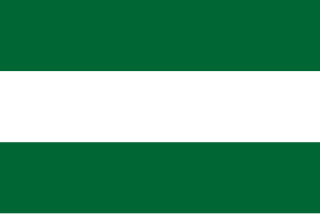
The Durrani Empire or the Afghan Empire, also known as the Sadozai Kingdom, was an Afghan empire that was founded by Durrani tribe of Pashtuns, under the Ahmad Shah Durrani in 1747, that spanned parts of Central Asia, the Iranian plateau, and the Indian subcontinent. At its peak, it ruled over the present-day Afghanistan, much of Pakistan, parts of northeastern and southeastern Iran, eastern Turkmenistan, and northwestern India. Next to the Ottoman Empire, the Durrani Empire is considered to be among the most significant Islamic empires of the second half of the 18th century.
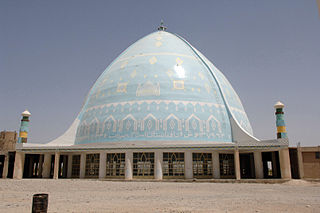
Kandahar is a city in Afghanistan, located in the south of the country on the Arghandab River, at an elevation of 1,010 m (3,310 ft). It is Afghanistan's second largest city after Kabul, with a population of about 614,118. It is the capital of Kandahar Province and the centre of the larger cultural region called Loy Kandahar.

Pashtunistan is a region located on the Iranian Plateau, inhabited by the indigenous Pashtun people of southern Afghanistan and northwestern Pakistan, wherein Pashtun culture, the Pashto language, and Pashtun identity have been based. Alternative names historically used for the region include Pashtūnkhwā (پښتونخوا), Pakhtūnistān, Pathānistān, or simply the Pashtun Belt.

Emir Dost Mohammad Khan Barakzai, nicknamed the Amir-i Kabir, was the founder of the Barakzai dynasty and one of the prominent rulers of Afghanistan during the First Anglo-Afghan War. With the decline of the Durrani dynasty, he became the Emir of Afghanistan in 1826. An ethnic Pashtun, he belonged to the Barakzai tribe. He was the 11th son of Payendah Khan, chief of the Barakzai Pashtuns, who was killed in 1799 by King Zaman Shah Durrani.
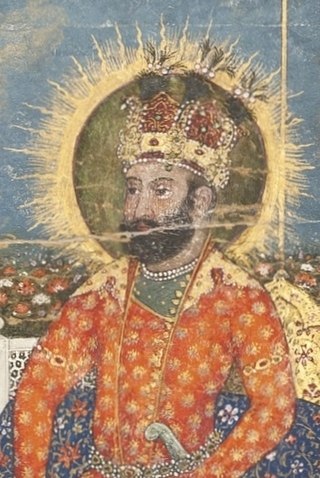
Zaman Shah Durrani, or Zaman Shah Abdali, was the third King of the Durrani Empire from 1793 until 1801. An ethnic Pashtun of the Sadozai clan, Zaman Shah was the grandson of Ahmad Shah Durrani and the fifth son of Timur Shah Durrani.

The Ghiljī also spelled Khilji, Khalji, or Ghilzai and Ghilzay (غلزی), are one of the largest Pashtun tribes. Their traditional homeland is Ghazni and Qalati Ghilji in Afghanistan but they have also settled in other regions throughout the Afghanistan-Pakistan Pashtun belt. The modern nomadic Kochi people are predominantly made up of Ghilji tribes. The Ghilji make up around 20–25% of Afghanistan's total population.
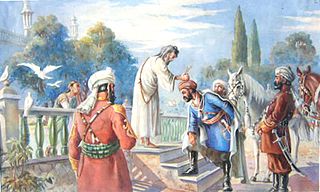
The Durrānī, formerly known as Abdālī (ابدالي), are one of the largest tribes of Pashtuns. Their traditional homeland is in southern Afghanistan, straddling into Toba Achakzai in Balochistan, Pakistan, but they are also settled in other parts of Afghanistan and parts of Khyber Pakhtunkhwa.
Qizilbash or Kizilbash were a diverse array of mainly Turkoman Shia militant groups that flourished in Azerbaijan, Anatolia, the Armenian highlands, the Caucasus, and Kurdistan from the late 15th century onwards, and contributed to the foundation of the Safavid dynasty in early modern Iran.

Mohammadzai, also spelled Moḥammadzay, is a Pashtun sub-tribe or clan of the Barakzai which is part of the Durrani confederacy of tribes. They are primarily centered on Kandahar, Kabul and Ghazni in Afghanistan as well as in the city of Charsadda in neighbouring Pakistan. The Mohammadzai ruled Afghanistan from 1823 to 1978, for a total of 155 years. Their rule ended under Daoud Khan when the Communists took power via a Soviet-backed coup.

Afghanistan is a multiethnic and mostly tribal society. The population of the country consists of numerous ethnolinguistic groups: mainly the Pashtun, Tajik, Hazara, and Uzbek, as well as the minorities of Aimaq, Turkmen, Baloch, Pashai, Nuristani, Gujjar, Brahui, Qizilbash, Pamiri, Kyrgyz, Sadat, Mongol and others. Altogether they make up the Afghan people.

Alakozai is a Pashtun tribe in Afghanistan. They are one of the four tribes of the Zirak tribal confederacy of Durrani Pashtuns.
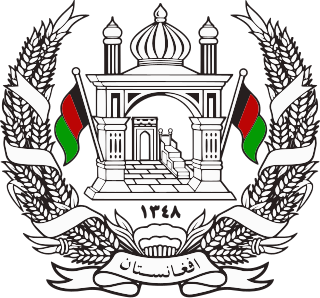
The Barakzai dynasty also known as the Muhammadzai dynasty ruled modern day Afghanistan from 1823 to 1978 when the monarchy ended de jure under Musahiban Mohammad Zahir Shah and de facto under his cousin Sardar Mohammad Daoud Khan. The Barakzai dynasty was established by Dost Mohammad Khan after the Durrani dynasty of Ahmad Shah Durrani was removed from power. The Muhammadzai era was known for its progressivist modernity in which Afghanistan was referred to as the "Switzerland of Asia".

The Pashtun tribes, are tribes of the Pashtun people, a large Eastern Iranian ethnic group who speak the Pashto language and follow Pashtunwali, the social code of conduct for Pashtuns. They are found primarily in Afghanistan and Pakistan and form the world's largest tribal society, comprising over 60 million people and between 350 and 400 tribes and clans. They are traditionally divided into four tribal confederacies: the Sarbani (سړبني), the Bettani (بېټني), the Ghurghusht (غرغښت), the Karlani (کرلاڼي) and a few allied tribes of those that are Ismailkhel, Khel, Ludin, Sakzai, and Zai.
The Karai, Qarai, or Qara ("Black") Tartars are a Turkic tribe found in Khorasan, Azerbaijan, Kerman, and Fars.

Pashtun nationalism is an ideology that claims that the Pashtuns form a distinct nation and that they should always be united to preserve their culture and homeland. In Afghanistan, those who advocate Pashtun nationalism favour the idea of a "Greater Afghanistan", which includes Khyber Pakhtunkhwa, and be ruled directly under Pashtun principles.
Shāh Abdul Azīz Hotak was the second ruler of the Ghilji Hotak dynasty of Kandahar, in what is today the state of Afghanistan. He was crowned in 1715 after the death of his brother, Mirwais Hotak. He was the father of Ashraf Hotak, the fourth ruler of the Hotak dynasty. Abdul Aziz was killed in 1717 by his nephew Mahmud Hotak. The tradition of parricide continued as Mahmud died at the hands of his cousin and Abdul Azīz's son Ashraf.

Bārakzai is the name of a Pashtun tribe from present-day, Kandahar, Afghanistan. '"Barakzai" is a common name among the Pashtuns and it means "son of Barak" in Pashto. According to the Encyclopædia Iranica, "In the detailed Pashtun genealogies there are no fewer than seven instances of the ethnic name Bārakzī, at very different levels of tribal segmentation. Six of them designate simple lineages within six different tribes located in the Solaymān mountains or adjacent lands... The seventh instance, on the other hand, designates one of the most important Pashtun tribes in numbers and historic role, part of the Zīrak branch of the Dorrānay confederation.
Fateh Khan Barakzai or Wazir Fateh Khan or simply, Fateh Khan, was Wazir of the Durrani Empire during the reign of Mahmud Shah Durrani until his torture and execution at the hands of Kamran Shah Durrani, the son of the ruler of the Durrani Empire, and Mahmud Shah Durrani, and other prominent conspirators such as Ata Mohammad Khan. Fateh Khan was of the Barakzai tribe, and his death led to his tribe revolting and the eventual deposition of Mahmud Shah Durrani.

Afghan Qizilbash are a Turkic ethnic group in Afghanistan. The Afghan Qizilbash are descendants of the Qizilbash, which were a militant group mostly made up of Turkomans. Their language is Dari. They follow Twelver Shia Islam.
References
- ↑ Noelle, Christine (25 June 2012). State and Tribe in Nineteenth-Century Afghanistan: The Reign of Amir Dost Muhammad Khan (1826-1863). ISBN 9781136603174.
- ↑ Estrin, James (February 4, 2013). "A Hard Life on the 'Roof of the World'". The New York Times.[ verification needed ]
- ↑ "Wak.p65" (PDF). Retrieved 2013-02-28.[ verification needed ]